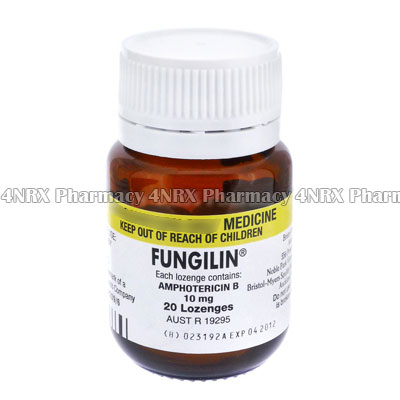 |
Home  Infection Infection  Fungilin (Amphotericin) Fungilin (Amphotericin) |
|
|||||||||
|
|
Fungilin (Amphotericin)
What is Fungilin (Amphotericin) used for? Fungilin (Amphotericin) is an oral antifungal medication prescribed to treat oral thrush. The medication destroys or stops the reproduction of fungus cells allowing the immune system to destroy the infection naturally. Your physician may prescribe it for other unlisted conditions, as well. How should I use Fungilin (Amphotericin)? One losenge of Fungilin (Amphotericin) is normally administered four times each day for a medication cycle lasting one or two weeks, but your instructions will depend on your current health condition and the severity of your symptoms. Place the lozenge into the mouth and allow the saliva to completely dissolve the medication to make sure the entire dose is administered. Do not stop using the medication before being told to do so, even if your symptoms seem to have disappeared, as the infection may not be gone and can return stronger or more resistant to treatment. What are the side effects of Fungilin (Amphotericin)? Side effects that may occur while using Fungilin (Amphotericin) include:
Stop using the lozenges and contact your physician immediately if you experience any intense or worrying symptoms being especially cautious about signs of an allergic reaction such as hives, swelling, or trouble breathing. These conditions may require adjustments to your application frequency to prevent more health problems from occurring. Please Note Do not begin using Fungilin (Amphotericin) if the patient being treated is a child, allergic to amphotericin, or has had a bad reaction to similar treatments in the past. You are also suggested to disclose any chronic health conditions you have that may cause unexpected problems during treatment. Strictly follow all instructions provided to you by your physician or pharmacist while using Fungilin (Amphotericin). Optimum and safe dosage can differ based on the patient and the condition being treated. As this medication may be unsafe for certain patients, it is essential you always inform your physician if you are pregnant or breastfeeding, as well as if you have any allergies, other illnesses, or ongoing health conditions, and if you are taking any other form of medication, supplements, or herbal products. Immediately seek emergency medical care if you have an allergic or hypersensitive reaction. Common signs of a reaction include hives, swelling, skin rashes, chest pains, as well as trouble breathing or swallowing. 
|
||||||||||||||||||||||